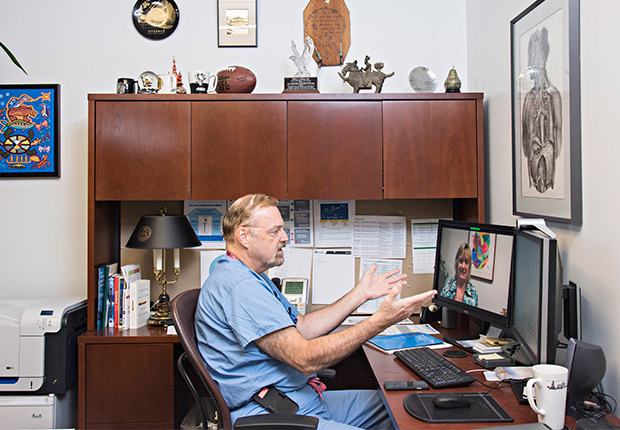AARP Hearing Center

The PA General Assembly is currently considering legislation (SB 780 and HB 1648) that would recognize telemedicine as a solution to improving health care access. AARP PA strongly supports the proposed legislation. You can learn more about the issue below.
What is Telemedicine?
Telemedicine or telehealth embraces the use of computers, cellphones or other communication technology to provide patients with the health care they need, when they need it. It doesn’t replace one-on-one, in-person interactions with a doctor, nurse or other health care practitioner. Instead, it creates new and enhanced ways to get care and to take charge of your own or a loved one’s health. For example:
- A monitoring device that can alert a family caregiver and emergency health care providers when the person being cared for has a stroke or heart attack, or suffers a serious injury
- A monitoring device used after someone is released from the hospital to track their progress and vital signs
- A video chat or online visit with a doctor
- A video chat with a health care professional in an emergency situation to provide instructions while waiting for help to arrive
How can Telemedicine help Pennsylvanians?
Telemedicine has the potential to improve access to both health care and home and community based-services (HCBS), and increase choice of providers, especially in rural areas. This is particularly important in a place like Pennsylvania, which has the third largest rural population and the fourth oldest population of any state.
In addition, there are 1.65 million family caregivers in Pennsylvania who provide unpaid care to a friend or loved one and who could benefit from broader adoption and access to telemedicine. Telemedicine can bring routine and specialty health services home when trips out are challenging. Working and long-distance family caregivers can virtually join their loved ones’ medical visits and care plan meetings, so they can help manage their care.
Pennsylvania does not currently require private health insurers to offer comparable coverage for telemedicine-provided services to that of in-person services. A majority of states across the country have enacted this type of requirement, including Pennsylvania’s neighbors of Delaware, Maryland, and New York. Similarly, Pennsylvania does not cover certain telemedicine services under Medicaid, and the types of medical professionals that can be paid for telemedicine services in Pennsylvania’s Medicaid system are also very limited compared to other states.
What is included in the Telemedicine Act - SB780 / HB1648
- Defines “telemedicine”
- Sets licensing requirements for telemedicine health care practitioners
- Sets standards for a patient creating a telemedicine relationship with a practitioner
- Requires health insurers to pay for telemedicine services if they pay for the same service in-person
- Covers telemedicine more broadly in Medicaid































































